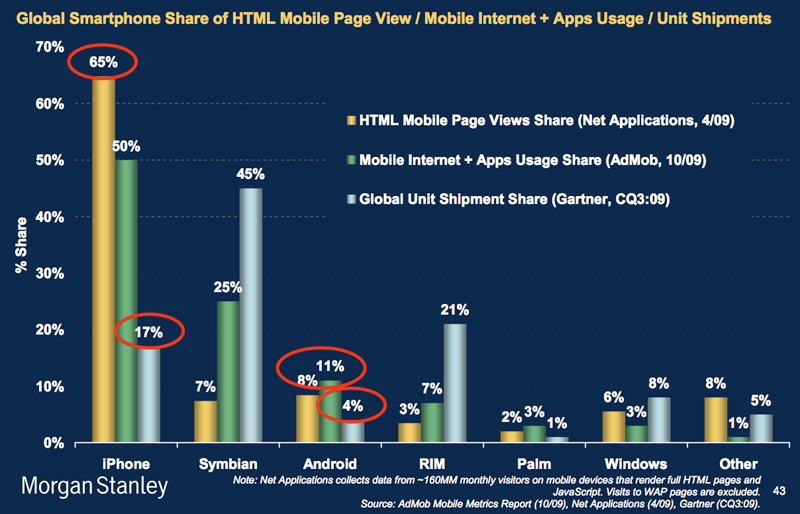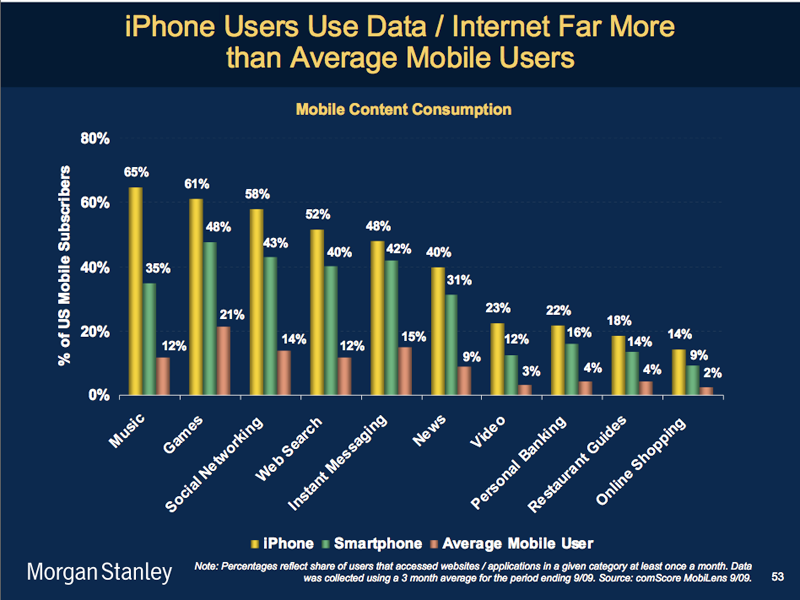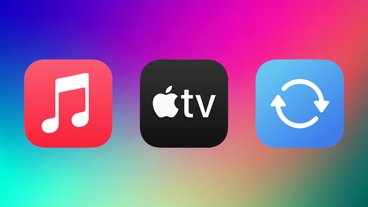Apple seen in 'pole position' to control mobile Internet computing
In its first nine quarters on the market, the iPhone and iPod touch significantly outpaced Netscape, AOL and NTT's DoCoMo. Mary Meeker and a team of analysts at Morgan Stanley believe this shows Apple has a lead of two or three years over its competitors in the mobile Internet space.
The figures and predictions were the highlight of a presentation this week from Morgan Stanley called "The Mobile Internet." Philip Elmer-DeWitt of Fortune Brainstorm Tech summarized the seminar, which focused on the rapid rate of adoption seen by the iPhone and iPod touch platform.
After 9 quarters, the iPhone and iPod touch have reached an install base of 57 million users. By that same point, DoCoMo had achieved 25 million users, Netscape 11 million, and AOL just 7 million. Apple's platform has also outpaced the debuts of game consoles like the Nintendo Wii, Nintendo DS and Sony PSP.
The presentation included a number of incredible statistics: Though the iPhone and iPod touch represents just 17 percent of global smartphones, the two devices are responsible for 65 percent of handheld Web browsing, according to Net Applications, and half of all mobile app usage, according to AdMob. Compare that to Nokia's Symbian platform, which has 45 percent of all mobile devices, but just 7 percent of the Web share.
The Morgan Stanley presentation goes on to define the future of the mobile Internet as the overlap between social networking and mobile devices. More specifically it is the "sweet spot," as Elmer-DeWitt called it, where the 430 million Facebook users (and their 350,000 applications) overlap with the 57 million iPhone users (and their 100,000 applications).
It demonstrates a trend shown with Mixi, Japan's leading social network, which has seen its monthly page views become dominated by mobile devices. As of the third quarter of 2009, 72 percent of Mixi visitors accessed the site via a handheld device.
The 2000s are predicted to mean for the start of mobile computing what the 1990s were for the Internet age. With so many devices in people's pockets and 200 million iTunes subscribers ready to buy applications and media content, Apple is in the "pole position" to lead the mobile computing race, the report concluded.
While the iPhone gets most attention, the iPod touch has become a significant portion of the mobile Internet market, and an integral part of Apple's iPhone OS strategy. Earlier this month, one report found that the iPod touch has been gaining in share of mobile device usage, at the expense of the iPhone. It is estimated that about 40 percent of iPhone OS users are on the iPod touch.
As iPod touch users are also likely to have an iTunes account to buy applications and media, the youth who use the mobile device are seen as likely to eventually migrate to Apple's "premium" iPhone as they get older. This further ties them into the Apple ecosystem, and would fuel the company's growth in the mobile Internet space.
 Neil Hughes
Neil Hughes












 William Gallagher
William Gallagher
 Christine McKee
Christine McKee
 Michael Stroup
Michael Stroup
 William Gallagher and Mike Wuerthele
William Gallagher and Mike Wuerthele


 Chip Loder
Chip Loder
 Andrew Orr
Andrew Orr







